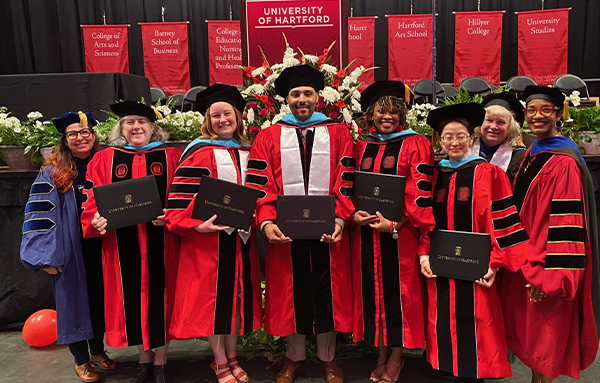The Doctor of Education in Educational Leadership for Social Justice program reflects the latest thinking and research on higher education leadership, organizational dynamics, and institutional change through the lens of inclusive excellence, justice and belonging values. It offers advanced training to mid-career adult leaders interested in shaping their postsecondary education work environments into dynamic learning communities.
Students who successfully complete this program are awarded a Doctor of Education (EdD) with a specialization in leadership for social justice.
The EdD program is designed for working adults. Students typically enroll in two remote synchronous evening courses each fall and spring, and dissertation work in the summer.
- 51 credits (effective Fall 2023)
- Cohort model
- Remote synchronous format
- Fall start
- Course Catalog
- Request Information
- Apply
Certificate Program
- Learn more about our 12-credit Certificate in Teaching for Social Justice in Higher Education.
About Our Program
Our EdD program focuses on high-impact, practical research that makes a difference at your institution. Hear more from our students and faculty in this short video.
Special Features of the Program

- We deliberately seek to maintain a diverse student body, drawn from universities, colleges, schools, health-related professions, government, and human service organizations. These individuals are typically fully employed, bringing with them significant work experience and dedication to improving their respective constituencies.
- Admission is granted in the fall semester.
- The variety of each cohort lends itself to vibrant student-faculty interactions in and out of the classroom. This, in turn, leads to a sense of shared commitment to acquiring knowledge, developing and practicing leadership skills, and conducting research in the context of “a private University with a public purpose.”
Our Alumni
Many graduates of our EdD program have advanced to senior leadership positions in education and health care. They include:
Mark Benigni, EdD, Superintendent - Meriden Public Schools; Mayor - City of Meriden, 2001-2008
Steven Minkler, BA, MA, EdD, Associate Vice President for Academic Affairs, Central Connecticut State University
Lisa O’Connor, BS, MSN, EdD - Dean of the School of Nursing, Quinnipiac University
Marisol Aponte Ostrov, EdD, Director - Health Services, Central Connecticut State University
William Perez, EdD, Chief - Fire Department, University of Connecticut
Maria Tackett, EdD, Nursing Director, Professional Practice, Hartford Hospital
Danielle Wilken, EdD, President, University of Bridgeport
Degree Requirements
Students complete a minimum of 51 credit hours (effective Fall 2023) beyond an earned master’s degree in order to be eligible to receive the Doctor of Education (EdD) degree in Social Justice.
EDD 821 Critical and Social Justice Policies
EDD 825 Inclusive Instruction in Higher Education
EDD 826 Ethics and Practice of Research
EDD 827 Leadership for Social Justice
EDD 828 Organizational Theory and Change
EDD 834 Social Foundations of Higher Education
EDD 837 Diversity, Equity, Inclusion, and Justice in Higher Education
EDD 840 Research Methods for Social Justice
EDD 842 Qualitative Research Methods
EDD 843 The New Professoriate
EDD 844 Quantitative Research Methods
EDD 845 Structural Equity in Classroom Assessment
EDD 852 Dissertation Inquiry 1
EDD 853 Dissertation Inquiry 2
EDD 861 Dissertation Writing and Research
Program Completion Plan
Students may enter the program into any of these three course blocks (A, B, C).
Fall A
EDD 834 Social Foundations of Higher Education
EDD 837 Diversity, Equity, Inclusion, and Justice in Higher Education
Spring A
EDD 827 Leadership for Social Justice
EDD 828 Organizational Theory and Change
Summer A
EDD 852 Dissertation Inquiry 1
Fall B
EDD 826 Ethics and Practice of Research
EDD 844 Quantitative Research Methods
Spring B
EDD 840 Research Methods for Social Justice
EDD 842 Qualitative Research Methods
Summer B
EDD 853 Dissertation Inquiry 2
Fall C
EDD 825 Inclusive Instruction in Higher Education
EDD 845 Structural Equity in Classroom Assessment
Spring C
EDD 821 Critical and Social Justice Policies
EDD 843 The New Professoriate
Summer C – Until completion
EDD 861 Dissertation Writing and Research (minimum 9 credits)
EdD Program News

Congratulations to the most recent graduates from the Educational Leadership doctoral program! The graduate commencement ceremony was held on Sunday, May 14, 2023 at the XL Center, where each graduate was hooded by their faculty research advisor.
Pictured L-R: Professor Karla Loya, Joanne Menard, Amy Donofrio, Miguel Maria, Tamika Davis, Lucy Wang, Professor Karen Case, Professor K. Kayon Morgan. Not pictured: Stephanie Brown and Julie Schlossinger.
Application Process
Graduate program events are held throughout the year. Open Houses are held in the Spring and Fall. Learn more at our Graduate visit opportunities.
Application - Phase 1
You must hold a completed master's degree in a related field by the start of your program. We prefer that you have professional experience (minimum of 3 years) and demonstrated professional commitment to equity and social justice. Applicants must also meet for an interview with program faculty.
Admission is granted in the fall and spring semesters. To apply online, use the link below. The following are required materials for the EdD program application:
- Official transcripts from all collegiate coursework
- Letter of Intent indicating area of scholarly interest (e.g., postsecondary instruction, organizational models for higher education, social foundations, research methodologies)
- Two letters of recommendation
- Writing sample
- Essay
- Resume or curriculum vitae
The University of Hartford is not able to support F-1 visas for international students pursuing the EdD program since it is offered in a remote format. International students who do not require an F-1 student visa are welcome to apply. There are additional requirements for international students which can be viewed here.
Faculty members in the program review applications on a rolling basis, typically once a month.
Interview - Phase 2
Once the faculty has reviewed an application, you may receive notification requesting an interview with a member of the Doctor of Education in Educational Leadership faculty. The admission interview is the last phase in the application process.
Upon acceptance into the program, students are required to pay a $300 non-refundable deposit which will be applied to their tuition.
Deadlines and Dates
Admission into the EdD program can occur for the fall semester. Applications are accepted year-round on a rolling basis. Prospective students should submit completed materials as soon as possible. The admission committee will review complete applications in the order in which they are received.
Meet Your Success Counselor
Additional Information
| Per Credit Rate | |
|---|---|
| Educational Leadership, EdD |
$889.00 |
Prospective students interested in learning more about the program may contact:
Graduate Study Office
860.768.4371
800.945.0712
GradStudy@hartford.edu
Current students may contact:
Department of Education
860.768.5734
deptofed@hartford.edu